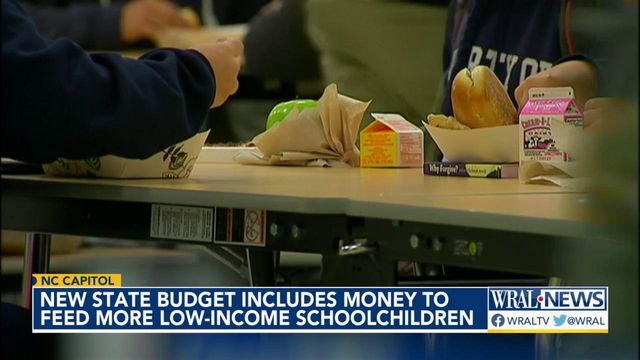New state budget takes aim at hunger in schools
Tucked away among its hundreds of pages, North Carolina’s new budget includes several provisions that should give more students access to no-cost meals in schools statewide.
The measure, which is expected to become law Tuesday, includes $6 million dollars this year to cover the cost of meals for students who qualify for reduced-price meals at schools.
Federal guidelines include a sliding income scale for free and reduced-cost school breakfast and lunch. Advocates for child nutrition say the copays for reduced-costs meals can still be enough to keep some kids from being able to eat at school.
According to legislative staff, about 25,000 low-income students statewide are currently paying for reduced-cost meals out of pocket. The $6 million appropriation should be enough to cover all of them.
Another budget provision bans public and charter schools from imposing administrative penalties on students for unpaid meal costs. Schools sometimes withhold transcripts or report cards due to unpaid balances, and some have even blocked students from graduating. That will no longer be allowed.
A third provision, set to take effect in 2024, offers additional state funding as an incentive for schools to sign up for a federal program that requires universal free meals in schools.
The Community Eligibility Provision program, administered by the U.S. Department of Agriculture, gives federal funding to qualifying schools to offer free breakfast and lunch for all students.
Advocates say making free school meals universally available eliminates the need for low-income families to apply. It also removes the social stigma that can discourage eligible students from using the program, they say.
To qualify in the past, at least 40% of a school’s population must qualify for free or reduced-cost meals. According to legislative staff, 1,623 of the state’s 2,500 or so schools are already enrolled in the CEP program.
However, CEP funds don’t cover the full cost of meals for students who do not qualify for free or reduced-cost lunch. The school or district has to cover the balance. For some schools, that’s been too expensive, putting CEP out of reach.
The budget provides $6.3 million for the 2024-25 school year as an incentive for more schools to sign up for the CEP program. The money will be available to help cover the outstanding cost, making it more financially feasible for some.
A spokeswoman for the NC Dept. of Public Instruction said state Superintendent of Public Instruction Catherine Truitt has been a longtime advocate for reduced-cost meal coverage.
"This policy effort is even more important today as families across the state feel the uncertainty of our fluctuating economy and the pressures of inflation," said spokeswoman Jeanie McDowell in a statement "Superintendent Truitt advocated for the General Assembly to pass this specific budget provision, and we are all grateful it was reflected in the conference budget."
Republican legislative leaders did not respond to WRAL's request for comment.
The budget is expected to become law without Democratic Gov. Roy Cooper’s signature. Cooper objected to other provisions in the budget but has said he won’t veto it, in large part because the bill allows Medicaid to be expanded in the state, one of his top priorities.
The School Meals for All NC Coalition is a group of anti-hunger nonprofits that have been pushing state leaders to provide free breakfast and lunch to all students in North Carolina schools. Similar efforts have been made elsewhere in the country.
The coalition and similar groups say free meals lead to better educational outcomes, fewer disciplinary problems and improved attendance.
In a statement, the coalition called the budget provisions “important incremental steps,” especially the permanent elimination of copays for reduced-price meals.
"During the time the North Carolina General Assembly worked on the budget, schools in nine states started the school year offering school meals to all students at no cost to their families,” coalition’s leaders said in the statement.
Andrew Harrell is a spokesman and project manager with the Carolina Hunger Initiative, a coalition member based at UNC-Chapel Hill. He said his group is waiting to see what effect the CEP incentive plan will have. In the meantime, he was pleased to see a big increase in schools signing up for CEP this year, even without additional funds from the state.
“That growth shows how school boards and educators are recognizing the importance of access to school meals for all,” Harrell said.
NC Child executive director Erica Palmer Smith also praised the changes.
“For some children, their school is where they may get their only meal of the day,” SMith said. “This is a hard reality, but we at NC Child are heartened by the legislature's ongoing work to address child hunger by resourcing and enriching school lunch programs."











